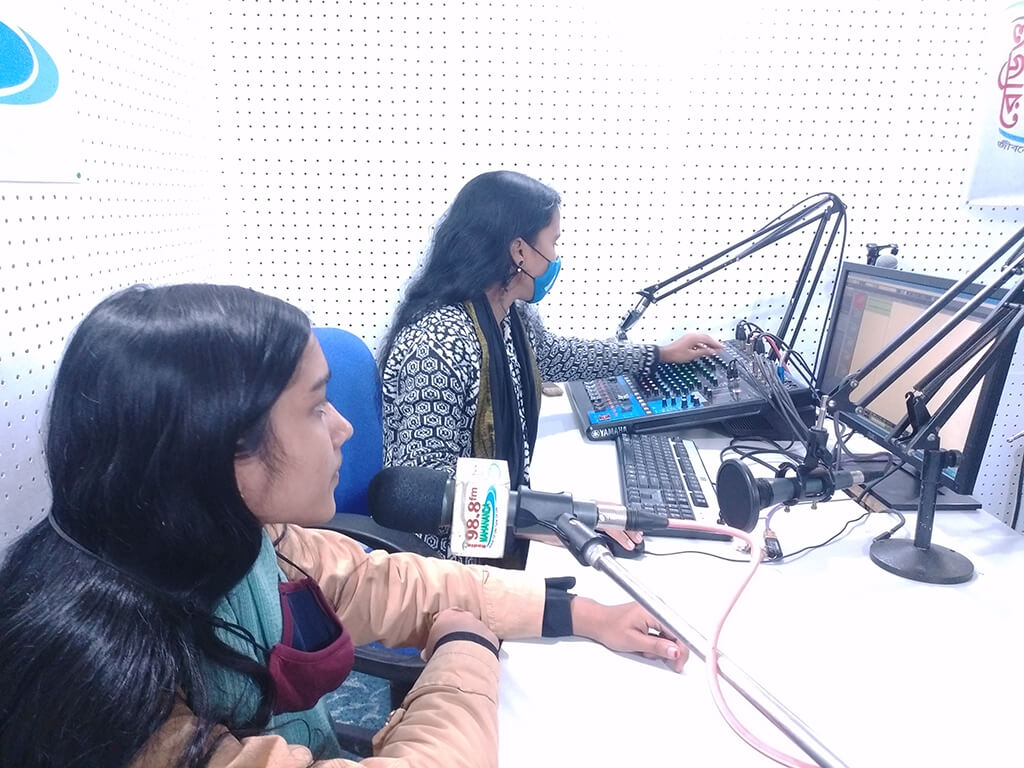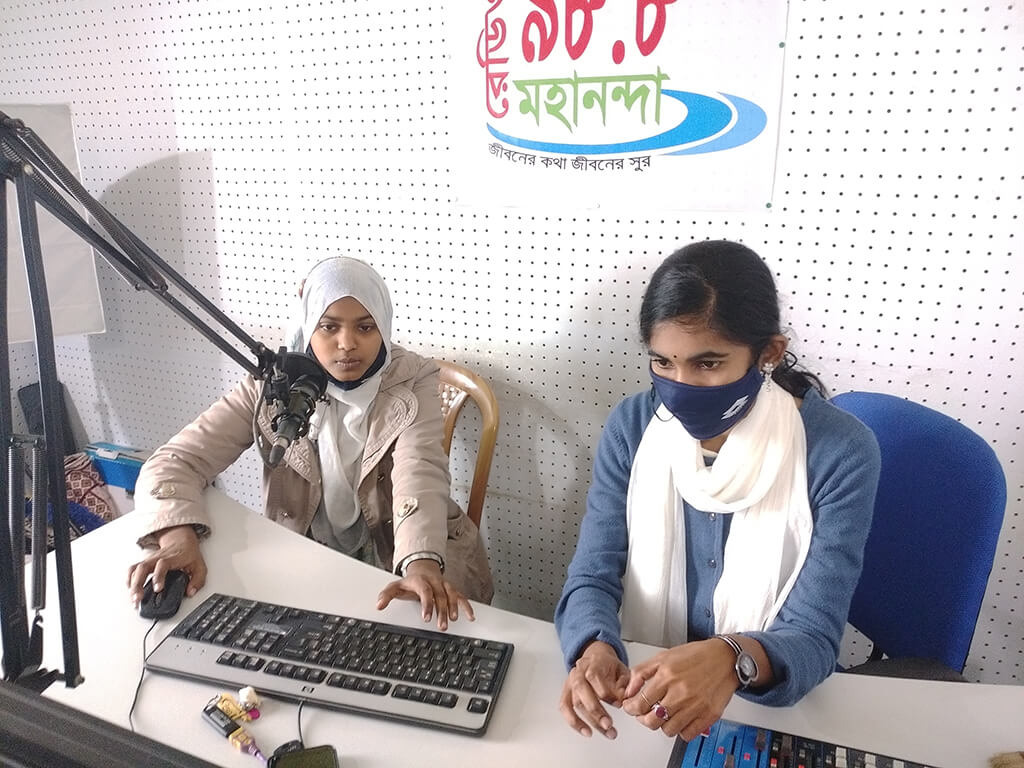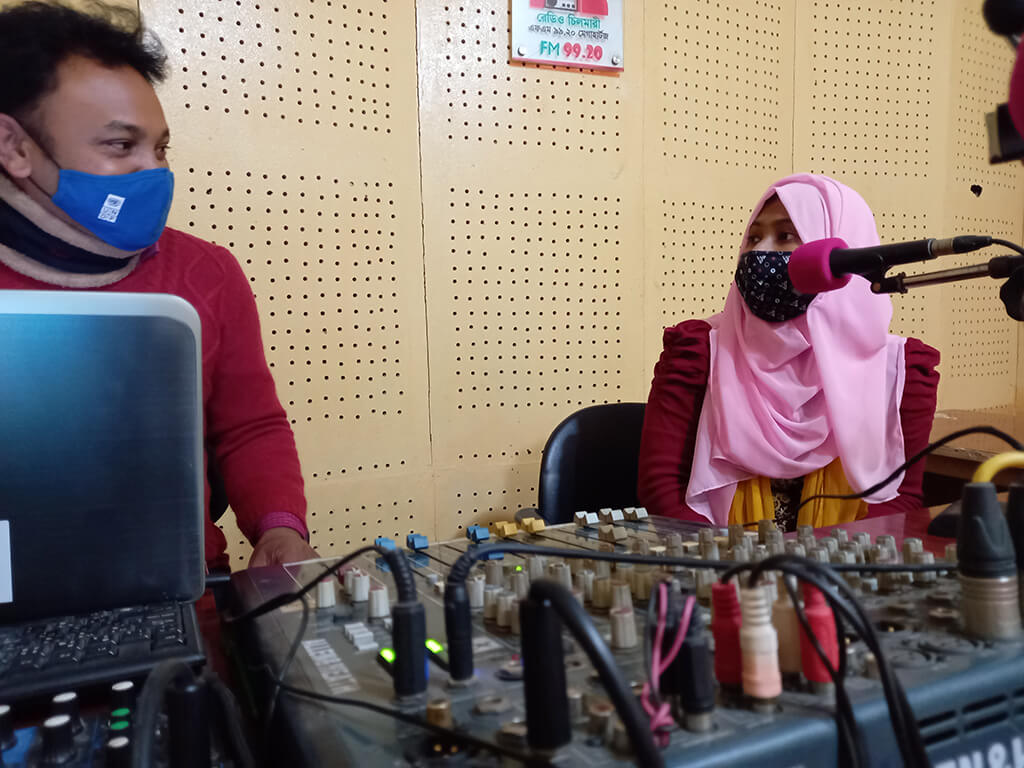Bangladesh NGOs Network for Radio and Communication (BNNRC) has been implemented the project titled Connecting and Empowering Voices for Just, Inclusive and Peaceful Society project supported by Switzerland in Bangladesh
Sustainable Development Goals (SDGs)-16 focuses on inclusive societies, democracy, strong institutions, justice and rule of law. SDG-16 is the key goal and the driver of all other sustainable goals. BNNRC aimed at fostering public debate for sustainable development for a peaceful and inclusive society. There is an intrinsic link between SDG-16 and SDG implementation.
To foster public debate and sensitize stakeholders for the meeting of these issues at the national and community level is very essential. BNNRC has been fostering public debates and sensitizing stakeholders at the national and community level with special emphasis on SDGs localization for a peaceful and inclusive society.
Goal: Enabling Environment to fight against poverty and injustice to contribute to sustainable inclusive development through SDG:16.
Objective: Men and women are empowered and connected to making a just, inclusive, and peaceful society.
Outcome 1: Institutions are engaged in public debate and policy advocacy for a peaceful and inclusive society
Outcome 2: Voice and participation of the youth and vulnerable communities in localization of SDG-16 is enhanced and amplified
Output-1: Institutions are engaged in public debate and policy advocacy for a peaceful and inclusive society
Output -2 Stakeholders enhance their participation and voice on the SDG-16 implementation process
In the new normal, many of our activities have moved online. In some ways, this has forced us to become more efficient. It has also forced many to rapidly adapt to a digital way of doing things, including working through Zoom, email, instant messaging, and various other apps. The trouble is, though, that a large segment of the population still lags behind when it comes to digital literacy at rural level in Bangladesh.
Addressing the challenge, Bangladesh NGOs Network for Radio & Communication (BNNRC), has been implementing initiatives to create enabling environment to fight against poverty and injustice to contribute to sustainable inclusive development through ICT education and digital literacy.
Under these initiatives, BNNRC has been supporting community radios to develop radio contents, organize series of live discussion and fellowship program for youth and youth women on varied issues including digital literacy, Up skill -Deskill in the era of 4IR, employment, entrepreneurship, start-up, TVET, gender disparity at community level and its progress, challenges, and way forward.
The radio programs both community radios and its Facebook Page crated an opportunity to link all stakeholders, students, unskilled persons, administrators. It promotes self- employment, youth entrepreneurship and technical trainings at the community level.
Replicability
The activities to be implemented to aware the community people particularly youth and women about employment generation and upskilling in digitally as well as service delivery points and concerned Service Providers are positive for providing their services will be carried out through series of radio program, which is replicable in any community.
As the community radio has always inspired the marginalized to share opinions to address political and social action. Beside it would be used as a tool for both active and passive communication and outreach in world wide.Besides, Social Media Campaign through radio’s Facebook page which will act as a virtual platform for young people who have ideas to share on how to reduction in poverty and inequality, providing quality education, gender equality, through building strong institutions and partnerships.
Sustainability
Through the initiatives radio huge numbers of broadcasters and fellows are now linked with the local community radio stations as professionals: as reporters, producers, and presenters. Now they are linked with the regional and national media (print and electronic) outlets as well as freelancer so that their professionalism can grow and continue.
Besides the radio programs provided youth and youth women with tools and skills that generate evidence to support their demands and help them to identify and prioritize areas of investment.
The program operates inclusively, including relevant media stakeholders (press clubs, local and national representatives of national media, community, government officers) which ensured long term empowerment building. The program also generated community-led priorities to inform policy-makers and duty bearers to make effective decisions regarding inclusive development.
Besides, by linking the social media platform will ensure that the program will have a deep, sustainable and multiplying impact, where the indirect beneficiaries will exceed several thousands.
WSIS values promotion
Through this intervention, WSIS values (Action line- C4) in Bangladeshi communities is strongly adhered and promoted extensively. This is done through building capacity of youth and youth women and encourages the local communities to up skilling on technology and digital literacy as well as self –learning and entrepreneurship.

Sustainable development goals (SDGs)
The radio programs and fellowship achieved through this project is linked to the SGDs in the following ways:
SDG-1. End poverty in all its forms everywhere: We are developing and certifying digital competencies; increasing productivity and helping people connect with opportunities through our community, helping them develop skills needed to access job opportunities in the digital economy.
SDG-4. Ensure inclusive and equitable quality education and promote lifelong learning opportunities for all: To ensure our goal of closing the digital divide, we had to make sure that people from all kinds of educational backgrounds acquired the necessary skills and knowledge.
SDG-5. Achieve gender equality and empower all women and girls: The hands on fellowship on community media journalism were primarily focused on vulnerable populations, including women heads of households.
SDG-8. Promote sustained, inclusive and sustainable economic growth, full and productive employment and decent work for all: The initiatives developed and certified digital competencies for youth and youth women in community level that help to employment and decent work
SDG-9.C- Significantly increase access to information and communications technology and strive to provide universal and affordable access to the Internet in least developed countries by 2020: The initiatives help to mobilize and aware the administration and policy makers for meaningful access to information and communications technology at community level.
SDG-10. Reduce inequality within and among countries: Educating the rural youth and youth women in digital economy issues will empower our young generation and diminish the existing gap that ICT creates among countries.
SDG-16. Promote peaceful and inclusive societies for sustainable development, provide access to justice for all and build effective, accountable and inclusive institutions at all levels: Some of the radio contents were focused on the topics of peace and inclusion.
Contribution to the implementations of WSIS Action Lines and the Sustainable Development Goals
The initiatives have addressed the Action Line C4 (Capacity building). Until to the wider community especially the youth community are not aware and skilled on present day’s technology with digital literacy, it is impossible to build a skilled, empowered, economically sound, inclusive and peaceful society.
Through the initiatives, a total of 1000 youth and youth women got the opportunity to use the computer in many different ways – a host of useful software and their operations. Browsing internet, websites, news portals, social media (YouTube, Facebook, etc.), audio and video editing, photo editing, reports writing, live meeting over Zoom, using of Google calendar. In addition to all these, they are also exposed to a number of radio and broadcasting instruments and panels as well as the safe use of internet and social media.
The radio talks/live discussion programs through community media and social platforms, the community people particularly youth groups were informed about the digital literacy, Up skill -Deskill in the era of 4IR, employment, youth entrepreneurship, start-up, TVET, gender disparity in youth education at community level and its progress, challenges, and way forward. After listening and participated the live discussion many of the youth were interested to received trainings on technical, vocational and education (TVET), up skilling their knowledge and started their start-up and became an entrepreneur at local level. Besides, related actors in the information society were sensitized about the aforesaid issues and came forward to provide trainings and others services to the interested youth community.
Impact
In the 21st century, digital skills are becoming increasingly important in all aspects of human life, learning, earning, and merely navigating the increasingly digitizing world. Inequality in digital capabilities, between rich and poor, men and women, rural and urban citizens, to name a few, has become a major concern worldwide because it is exacerbating the existing socioeconomic inequalities.
In the present context encouraging youth community to literate digitally, being one of the major purposes of the project, it comprises of 4 areas of strategic objectives for youths empowerment:
Amplifying youth’s voice and agency: This pertains to youths’ role as decision-makers in public and private spheres including politics and promotion of their leadership is considered here. Changed attitudes on women’s and girls’ rights, women’s enhanced knowledge of their rights, and increasing their bargaining power are reflected in.
Create an enabling environment for youth’s advancement: Improve the socio-political pace, legal and policy support, and congenial social norms for the youth and youth women. Oversight, enforcement of laws, regular collection of sex-disaggregated data, gender and social analysis skills including the capacity to develop, implement, and monitor gender strategies, understanding of gender issues too.
Increase youth’s economic benefits: youth’s access to productive assets, resources, services, skills, property, employment, income, information, technology, financial services, and other economic opportunities including community resources like land, water, forest, etc.
Improve Influencing power: Demanding issue-based solutions to achieve wellbeing and resilience of community and supporting people to hold local power holders accountable.
The radio contents and fellowship program created an enabling environment and engagement opportunities for disadvantage youth and youth women to enroll in community media. The capacity of rural youth and youth women in working as a bridge for the disadvantaged and marginalized community are developed. The skills, knowledge, and leadership role of the youth in their community were increased.
Challenges
The recent study by BIGD titled “Digital Literacy in Rural Bangladesh” shows that rural households are still lagging behind in adoption and use of e-services due to lack of proper access to information and communication technology (ICT) and the skills needed to operate devices.
Which rural Bangladeshi citizens are unlikely to make good use of the potentials of digital technology and more likely to face challenges in using services, including crucial public services, offered online.
In the new normal situation, the uses of technology is became an indispensible part of our life. But some limitations and challenges create barrier to digital inclusion as well youth empowerment-
Access: The lack efficient and affordable ICT infrastructure, especially in rural areas, remains a challenge.
Affordability: Excessive cost of internet connection and ICT devices is key obstacle to closing the digital divide.
Skills: The lack of digital skills and literacy skills is also a leading barrier to digital inclusion at community level. Greater investment in education, literacy and digital skills is urgently required.
Awareness/ Relevance: Many disadvantaged people have limited awareness of the benefits of the internet and ICTs or have few incentives to go online due to a scarcity of relevant content in their local language. Digital solutions, including those for low-skilled and low-literate users, are most effective when content is simple, clear and culturally relevant. Public awareness campaigns can enhance knowledge and cultural acceptance of services available online.
In spite of these challenges the campaign have certainly generated awareness among the community people especially youth and others stakeholders which encourages the organization to further plan and design how best to extend and expand the campaign will new formats and dimension.








